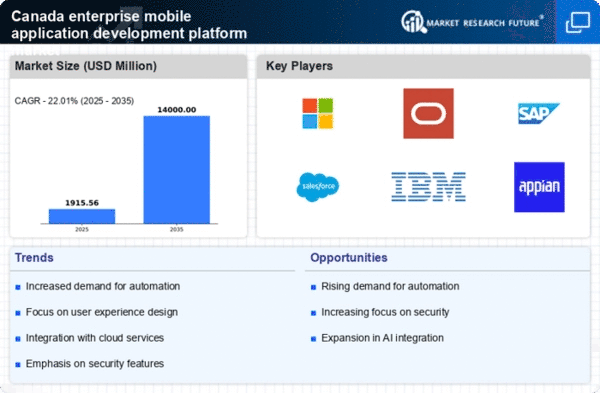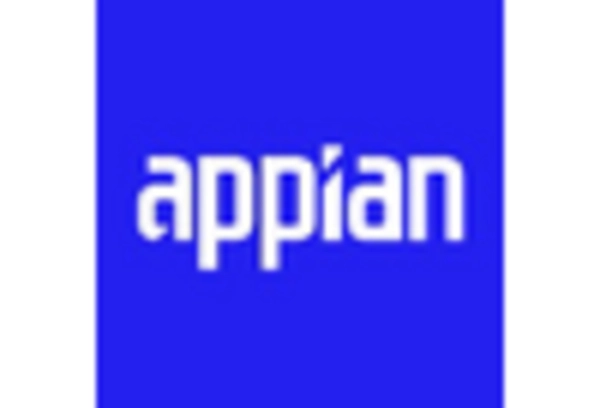Growing Demand for Mobile Solutions
The enterprise mobile-application-development-platform market is experiencing a surge in demand for mobile solutions across various sectors in Canada. Organizations are increasingly recognizing the necessity of mobile applications to enhance operational efficiency and customer engagement. According to recent data, the mobile application market in Canada is projected to grow at a CAGR of approximately 15% over the next five years. This growth is driven by the need for businesses to provide seamless user experiences and to stay competitive in a digital-first environment. As enterprises seek to leverage mobile technology, the demand for robust development platforms that facilitate the creation of high-quality applications is likely to increase, thereby propelling the enterprise mobile-application-development-platform market forward.
Shift Towards Digital Transformation
Digital transformation is a key driver influencing the enterprise mobile-application-development-platform market in Canada. Organizations are increasingly adopting digital technologies to streamline processes, improve customer interactions, and enhance overall productivity. This shift is evident as businesses allocate substantial budgets towards digital initiatives, with estimates suggesting that Canadian enterprises will invest over $20 billion in digital transformation by 2026. The need for mobile applications that support these digital strategies is paramount, as they enable real-time data access and facilitate remote work. Consequently, the enterprise mobile-application-development-platform market is poised to benefit from this trend, as companies seek platforms that can support their evolving digital landscapes.
Emergence of Cross-Platform Development
The emergence of cross-platform development is reshaping the enterprise mobile-application-development-platform market in Canada. Organizations are increasingly seeking solutions that enable them to develop applications that function seamlessly across multiple operating systems. This approach not only reduces development time and costs but also broadens the reach of applications. As a result, platforms that support cross-platform capabilities are gaining traction among Canadian enterprises. Market analysis suggests that the demand for cross-platform development tools will grow by approximately 30% over the next few years, indicating a strong shift towards versatile development solutions. This trend is likely to drive innovation and competition within the enterprise mobile-application-development-platform market.
Rising Need for Enhanced User Experience
The demand for enhanced user experience is driving the enterprise mobile-application-development-platform market in Canada. As consumers become more discerning, businesses are compelled to create applications that are not only functional but also intuitive and engaging. This trend is reflected in the increasing emphasis on user-centric design principles in application development. Companies are investing in platforms that allow for rapid prototyping and user testing, ensuring that applications meet user expectations. With the Canadian mobile app market projected to reach $5 billion by 2025, the focus on user experience is likely to remain a critical factor influencing the enterprise mobile-application-development-platform market.
Increased Investment in IT Infrastructure
Investment in IT infrastructure is a significant driver for the enterprise mobile-application-development-platform market in Canada. As organizations recognize the importance of robust IT systems to support mobile application development, they are channeling resources into upgrading their infrastructure. Reports indicate that Canadian businesses are expected to increase their IT spending by approximately 5% annually, with a notable portion directed towards mobile application development tools and platforms. This investment not only enhances the capabilities of existing systems but also fosters innovation, allowing enterprises to develop and deploy applications more efficiently. As a result, the enterprise mobile-application-development-platform market is likely to see substantial growth fueled by these infrastructure enhancements.
















